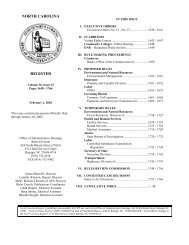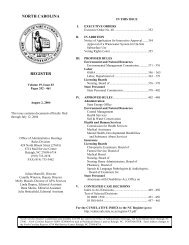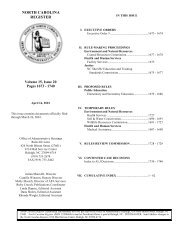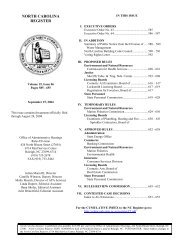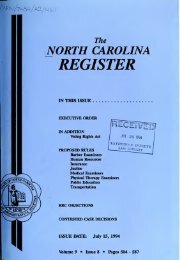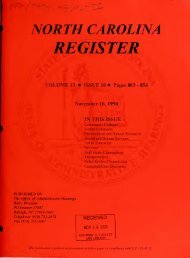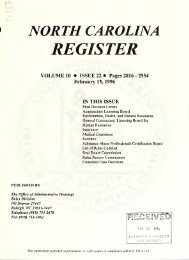NC Register Volume 21 Issue 09 - Office of Administrative Hearings
NC Register Volume 21 Issue 09 - Office of Administrative Hearings
NC Register Volume 21 Issue 09 - Office of Administrative Hearings
You also want an ePaper? Increase the reach of your titles
YUMPU automatically turns print PDFs into web optimized ePapers that Google loves.
PROPOSED RULES<br />
ice or beverage garnishes shall be removed from the beverage<br />
station. This requires standard counter protector installations for<br />
all cafeteria counters, salad bars and similar type service to<br />
prevent contamination by customers' coughing and sneezing.<br />
Nothing in this Rule shall require food kept in enclosed cases to<br />
be wrapped or covered as long as effective measures are taken to<br />
prevent contamination in multi-level shelving units.<br />
(b) Consumer self-service is permitted only under the following<br />
conditions:<br />
(1) Buffet-style service. This style <strong>of</strong> service is not<br />
acceptable unless protective shields,<br />
equivalent to cafeteria county protectors, are<br />
provided to intercept contamination.<br />
(2) Consumer self-service. When customers are<br />
allowed to return to a self-service area, clean<br />
and sanitized tableware other than flatware,<br />
beverage cups and glasses, shall be made<br />
available for each return trip. Written notice<br />
shall be provided informing customers that<br />
clean tableware needs to be used for return<br />
trips.<br />
(3) Family-style service. In resident camps<br />
featuring this style <strong>of</strong> service, patrons elect to<br />
participate in the family dining-table type <strong>of</strong><br />
service. Ordinary serving dishes and utensils<br />
are acceptable.<br />
(4) Private events. When service is provided for a<br />
club, organization or private individual at a<br />
planned event from which the public is<br />
excluded:<br />
(A) potentially hazardous foods shall be<br />
replaced at least every two hours;<br />
(B) food containers shall be arranged<br />
conveniently so consumers' clothing<br />
does not come in contact with food;<br />
(C) long-handled serving spoons, tongs,<br />
or other utensils shall be provided and<br />
used;<br />
(D) at the conclusion <strong>of</strong> the event, food<br />
that has not been consumed, shall be<br />
discarded; and<br />
(E)<br />
protective shields are not required for<br />
buffet-style service.<br />
(c) Foods, except raw vegetables that are to be cooked, shall be<br />
kept under cover when not in the process <strong>of</strong> preparation and<br />
serving. Foods shall not be stored on the floor, or in direct<br />
contact with shelves and racks <strong>of</strong> cold storage boxes, or<br />
permitted to come in contact with dirty clothes, newspapers,<br />
pasteboard, previously-used paper or other contaminated<br />
surfaces. If open dishes and pans containing food are stacked,<br />
food shall be protected with wax paper, foil or plastic food film.<br />
Food transported to a camp shall not be accepted unless<br />
wrapped, boxed or covered to prevent contamination and<br />
maintained at temperatures required in Rule .3626 <strong>of</strong> this<br />
Section. Food and drink shall not be served to the general public<br />
in the kitchen.<br />
(d) Containers for onions, slaw, mustard and other condiments<br />
not kept in accordance with the requirements <strong>of</strong> Paragraph (a) <strong>of</strong><br />
this Rule shall have covers and be kept covered when not in use.<br />
Sugar shall be dispensed with either pour-type dispensers or<br />
individual packages. Staff shall avoid unnecessary handling <strong>of</strong><br />
food in the process <strong>of</strong> serving.<br />
(e) Dustless methods <strong>of</strong> floor cleaning shall be used and all<br />
except emergency floor cleaning shall be done during those<br />
periods when the least amount <strong>of</strong> food and drink is exposed,<br />
such as after closing, or between meals.<br />
(f) Foods shall not be stored under exposed sewer lines.<br />
(g) Dry beans, grits, flour, sugar and similar food products shall<br />
be stored in approved, covered containers, glass jars or equal and<br />
labeled accordingly.<br />
Authority G.S. 130A-235; 130A-248.<br />
15A <strong>NC</strong>AC 18A .3623 MILK AND MILK PRODUCTS<br />
(a) Only Grade "A" pasteurized milk and milk products shall be<br />
used. The term "milk products" shall mean milk products as<br />
defined in 15A <strong>NC</strong>AC 18A .1200. Copies <strong>of</strong> 15A <strong>NC</strong>AC 18A<br />
.1200 may be obtained from the Department <strong>of</strong> Environment and<br />
Natural Resources, Division <strong>of</strong> Environmental Health, 1632<br />
Mail Service Center, Raleigh, <strong>NC</strong> 27699-1632.<br />
(b) The mixing <strong>of</strong> cream and milk or the pouring <strong>of</strong> either into<br />
jars, bottles or other containers for storage therein shall be<br />
prohibited. Where meals are served in a communal or family<br />
type dining area, milk may be served by pouring it into<br />
individual glasses or cups from original containers <strong>of</strong> not more<br />
than one-gallon capacity, which have been provided by a milk<br />
distributor. The milk remaining in the container shall be<br />
immediately refrigerated and used for cooking purposes only.<br />
The transfer <strong>of</strong> milk from its original container into any type <strong>of</strong><br />
container other than glasses or cups as specified in this Rule is<br />
prohibited.<br />
(c) Bulk milk dispenser containers, as received from the<br />
distributor, shall be properly sealed, labeled with the name and<br />
grade <strong>of</strong> the contents and identity <strong>of</strong> the distributor. Only the<br />
outlet seal shall be broken in the establishment.<br />
(d) Milk and milk products shall be stored in a sanitary manner<br />
and shall be kept refrigerated, except when being served. Milk<br />
containers shall not be completely submerged in water.<br />
However, nothing in these Rules shall prohibit the placement <strong>of</strong><br />
these items on ice while on display or being served.<br />
(e) Reconstituted dry milk and dry milk products may be used<br />
in instant desserts and whipped products, or for cooking and<br />
baking purposes.<br />
Authority G.S. 130A-235; 130A-248.<br />
15A <strong>NC</strong>AC 18A .3624 ICE HANDLING<br />
(a) Ice that is to be used in fountain drinks, ice water, tea and<br />
c<strong>of</strong>fee, or in connection with the chilling or serving <strong>of</strong> salads,<br />
vegetables or other foods shall be manufactured from an water<br />
supply meeting the requirements <strong>of</strong> Rule .36<strong>09</strong> <strong>of</strong> this Section<br />
and shall be stored and handled in a sanitary manner.<br />
(b) Storage boxes shall be covered, located away from sources<br />
<strong>of</strong> contamination, maintained in good repair and kept clean.<br />
Storage bins or boxes shall be provided with rims and covers<br />
designed to exclude spillage and drip.<br />
(c) Ice grinders, pans and buckets used in preparing chipped or<br />
crushed ice shall be protected from contamination, thoroughly<br />
<strong>21</strong>:<strong>09</strong> NORTH CAROLINA REGISTER NOVEMBER 1, 2006<br />
792




